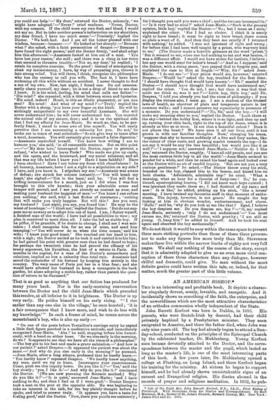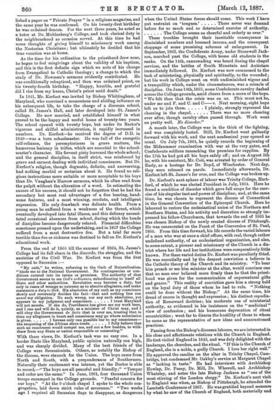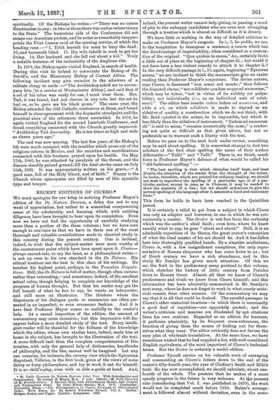AN AMERICAN BISHOP.* Tins is an interesting and profitable book.
It depicts a charac- ter singularly devout, manly, loveable, and energetic. And it incidentally shows us something of the faith, the enterprise, and the unworldliness which are the most attractive characteristics of an orthodox communion wholly independent of the State.
John Barrett Kerfoot was born in Dublin, in 1816. His parents, who were Scotch-Irish by descent, had their child privately baptized by a Presbyterian minister. They soon emigrated to America, and there the father died, when John was only nine years old. The boy had already begun to attend a Sun- day-school, conducted on the principles of the Episcopal Church by the celebrated teacher, Dr. Mnhlenberg. Young Kerfoot soon became devotedly attached to the Doctor, and the corre- spondence between the master and the pupil, which lasted as long as the master's life, is one of the moat interesting parts of this book. A. few years later, Dr. Mahlenberg opened a college at Flushing, on Long Island, and there Kerfoot began his training for the ministry. At sixteen he began to support himself, and he had already shown unmistakeable signs of an earnest and Evangelical religion. His diaries abound in the records of prayer and religious meditation. In 1832, he pub- • Life of tits Right Res. John Barrett iferfoot, D.D., LL.D., First Bishop of Pittsburgh. With Selections from his Diaries and Correspondence. Ball
Y
Harrison, M.A., Rector of St. John's Church, Howard County, Md. New York
James Poll and Co. 1580.
Eldred a paper on " Private Prayer " in a religious magazine, and the same year be was confirmed. On his twenty-first birthday he was ordained deacon. For the next three years, be acted as a tutor at Dr. Muhlenberg's College, and took clerical duty in the neighbourhood as occasion served. At this time he had some thoughts of giving himself to missionary work among the Nestorian Christians ; but ultimately he decided that his true vocation was at home.
As the time for his ordination to the priesthood drew near, be began to feel misgivings about the validity of his baptism, and this is the first definite sign which we note of his change from Evangelical to Catholic theology ; a change to which the study of Dr. Newman's sermons evidently contributed. He was conditionally rebaptized, and then was ordained priest, on his twenty-fourth birthday. "Happy, humble, and grateful did I rise from my knees, Christ's priest until death."
In 1841, Mr. Kerfoot was invited by Bishop Whittingham, of Maryland, who exercised a momentous and abiding influence on his subsequent life, to take the charge of a diocesan school, called St. james's Hall, and later developed into St. James's College. He now married, and established himself in what proved to be the happy and useful home of twenty-two years. The school opened with twenty boys, but under its Rector's vigorous and skilful administration, it rapidly increased in numbers. Dr. Kerfoot—he received the degree of D.D. in 1849—was a born schoolmaster. He was full of the energetic self-reliance, the peremptoriness in grave matters, the humorous leniency in trifles, which are essential to the school- master's character. His fervent piety leavened the whole school; and the general discipline, in itself strict, was reinforced by grave and earnest dealing with individual consciences. But Dr. Kerfoot's religion, though dogmatic, definite, and unswerving, had nothing morbid or sectarian about it. He found no reli- gions instructions more suitable or more acceptable to his boys than Dr. Vaughan's Harrow sermons, which he often read from the pulpit without the alteration of a word. In estimating the causes of his success, it should not be forgotten that he had the secondary but most real advantages of a fine bearing, hand- some features, and a most winning, resolute, and intelligent expression. His only drawback was delicate health. From a young man he suffered from a weakness of the throat, which eventually developed into fatal illness, and this delicacy necessi- tated occasional absences from school, during which the bonds of discipline become dangerously relaxed. Financial difficulties sometimes pressed upon the undertaking, and in 1857 the College suffered from a most destructive fire. But a trial far more terrible than fire or sickness was destined to fall on Dr. Kerfoot's educational work.
From the end of 1860 till the summer of 1864, St. James's College had its fall share in the discords, the struggles, and the anxieties of the Civil War. Dr. Kerfoot was from the first opposed to Secession :—
" My oath," be writes, referring to the Oath of Naturalization, "binds me to the National Government. No contingencies or con- ditions entered into its terms or promises. The authority of that Government seems to me God's ordinance, subordinating to itself all State and other authorities. Revolution may become a duty, but only in cases of wrongs so extreme as to absolve allegiance, and make resistance a duty to God. His absolution of my oath as my conscience slowly and reverently decides the fact—that and nothing less can annul my obligation. No such wrong, nor any such absolution, yet
appears to my judgment and conscience I trust Maryland will not secede. If she do, Providence has given me my work here, and I can and will do it, quietly, as a minister of Christ may, and I will obey the Government de facto that is over me, trusting that in time my allegiance in heart and conscience may go where submission
is given I foresee only one possible bar to my conscience—
the reopening of the African slave-trade I fully believe that such an enactment would compel me, and not a few besides, to with- draw from any State or nation responsible or consenting."
With these views, Dr. Kerfoot's task was no easy one. In a border State like Maryland, public opinion naturally ran high, and was sharply divided. Many of the best friends of the College were Secessionists. Others, as notably the Bishop of the diocese, were staunch for the Union. The boys came from North and South, with a preponderance of Southerners. Naturally their excitement was intense, yet the Doctor is able to record,—" The boys are all peaceful and friendly;" "Temper and order are the same." In June, 1861, four thousand Union troops encamped in the College grounds. "Fearful concern for our boys." "At the 9 o'clock chapel I spoke to the whole con- gregation, laid down strict rules of severance." "Two weeks ago I required all Secession flags to disappear, as dangerous
when the United States forces should come. This week I have
put restraint on 'tongues.' There never was demand before for so much and so determined exercise of authority.
The College seems as cheerful and orderly rie ever."
These troubles brought their inevitable consequence in diminished numbers and lessened income, and the consequent stoppage of some promising schemes of enlargement. In September, 1862, the Confederate Army, under Stonewall Jack- son, marched past the College, with lsome old students in the ranks. On the 14th, cannonading was heard during the chapel services, and the battles of South Mountain and Antietam immediately followed. Dr. Kerfoot was now summoned to the task of ministering, physically and spiritually, to the wounded; but his work in College went on with undiminished vigour and a tranquillity which, under the circumstances, was a miracle of discipline. On Jane 14th,1863, some Confederate cavalry dashed across the College grounds, amid cheers from a score of the boys. " We felt then that the crisis was on us. This must not be, under me and F. and C. and C—r. Next morning, eight boys left ns to join them I plainly, strongly repressed the cheering in the chapel There was no more cheering ever after, though cavalry often passed through. Work went on pretty well. No disorder."
A month later, the College was in the thick of the fighting, and was completely looted. Still, Dr. Kerfoot went gallantly forward with his work, and the next academical year opened as usual. On July 7th, 1864, he quietly records the beginning of the Midsummer examination with war at the very gates, and Confederate soldiers ransacking the premises for supplies. By the 17th he had got all his boys safely off; and on August 5th he, with his assistant, Mr. Coit, was arrested by order of General Early, as a hostage for Dr. Boyd, of Winchester. Next day, they were released on parole. Immediately afterwards, Dr. Kerfoot left St. James's for ever, and the College was broken up.
Dr. Kerfoot's next sphere of labour was Trinity College, Hart- ford, of which he was elected President in July, 1864. Here he found a condition of disorder which gave fall scope for the exer- cise of his singular tact and power of discipline; and, at the same time, he was chosen to represent the diocese of Connecticut in the General Convention of the Episcopal Church. Here he laboured to restore the ecclesiastical union of the Northern and Southern States, and his activity and discretion so strongly
im- pressed his fellow-Churchmen, that towards the end of 1865 he was chosen Bishop of the newly created diocese of Pittsburgh. He was consecrated on the Feast of the Conversion of St. Paul, 1866. From this time forward, his life records the varied labours of a man who was at once a chief officer, with real, though rather undefined authority, of an ecclesiastical organisation, and also, to some extent, a pioneer and missionary of the Church in a dis- trict where her life and her institutions were comparatively little known. For these varied duties Dr. Kerfort was peculiarly fitted. He was essentially and by the deepest conviction a believer in the Catholic theory of the Church and its ministry. "To hear him preach or see him minister at the altar, would convince one that no man ever believed more firmly than he that the priest- hood was given for the communication of supernatural gifts and graces." This reality of conviction gave him a strong hold on the loyal duty of those whom he had to rale. " Nothing could be done without the Bishop." At the same time, his dread of excess in thought and expression ; his distinct repudia- tion of Homeward doctrine; his moderate use of ministerial authority, as evidenced in his insistence on the " medicinal " view of confession ; and his humorous deprecation of ritual eccentricities ; went far to disarm the hostility of those to whom he came as the representative of new ideas and unaccustomed practices.
Passing from the Bishop's diocesan labours, we are interested in his close and affectionate relations with the Church in England. He first visited England in 1843, and was duly delighted with the landscape, the churches, and the ritual. "If this is the Church of England, she is a noble, a godly Church. I love her right well." He approved the candles on the altar in Trinity Chapel, Cam- bridge, but condemned Mr. Oakley's service at Margaret Chapel as "lacking in taste." He had interviews with Archbishop Howley, Dr. Pusey, Dr. Mill, Dr. Whewell, and Archbishop Whateley, and notes the late Bishop Jackson as "one of the most stirring of the London clergy." Dr. Kerfoot's next visit to England was when, as Bishop of Pittsburgh, he attended the Lambeth Conference of 1867. He was gratified beyond measure by what he saw of the Church of England, both materially and spiritually. Of the Bishops he writes:" There was no coarse Eraatianism in any; in two or three there was undue subserviency to the State." The humorous side of the Conference did not escape our American prelate, and he notes as remarkably inappro- priate the First Lesson read at the opening service, of which the heading rune :—" 1. Tobit leaveth his meat to bury the dead; 10, and becometh blind. 11. His wife taketh in work to get her living. 14. Her husband and she fall out about a kid." Truly a notable instance of the inelasticity of the Anglican rite.
In 1874, the Bishop again visited England, in search of health. Daring this visit he helped to consecrate the Bishop of St. David's, and the Missionary Bishop of Central Africa. The following incident may give occasion to the admirers of a celibate clergy to smile :—" The Archbishop asked me to accom- pany him [to a service at Westminster Abbey], and said that if a set of his robes was ready for use, I must wear them. Mrs. Tait, it was found, had not sleeves in any robe but the set he had on, so he gave me his black gown." The same year, the Bishop attended the Old Catholic conference at Bonn. and found himself in close agreement with the dogmatic standpoint and the practical aims of the reformers there assembled. In 1878, he again visited England for the second Lambeth Conference, and found everything connected with the Church greatly improved. Archbishop Tait does nobly. He is ten times as high and wide as eleven years ago."
The end was now nearing. The last few years of the Bishop's life were much occupied with the troubles which arose out of the religious reform in Mexico, and the anxieties and mortifications connected with this business preyed upon his health. On May 17th, 1880, he was attacked by paralysis of the throat, and the disease steadily gained ground, till the final stroke came on July 10th, 1881. It was appropriately written on his grave,—" A good man, full of the Holy Ghost, and of faith." Happy is the Church whose episcopates are filled by men of this apostolic type and temper.




































 Previous page
Previous page